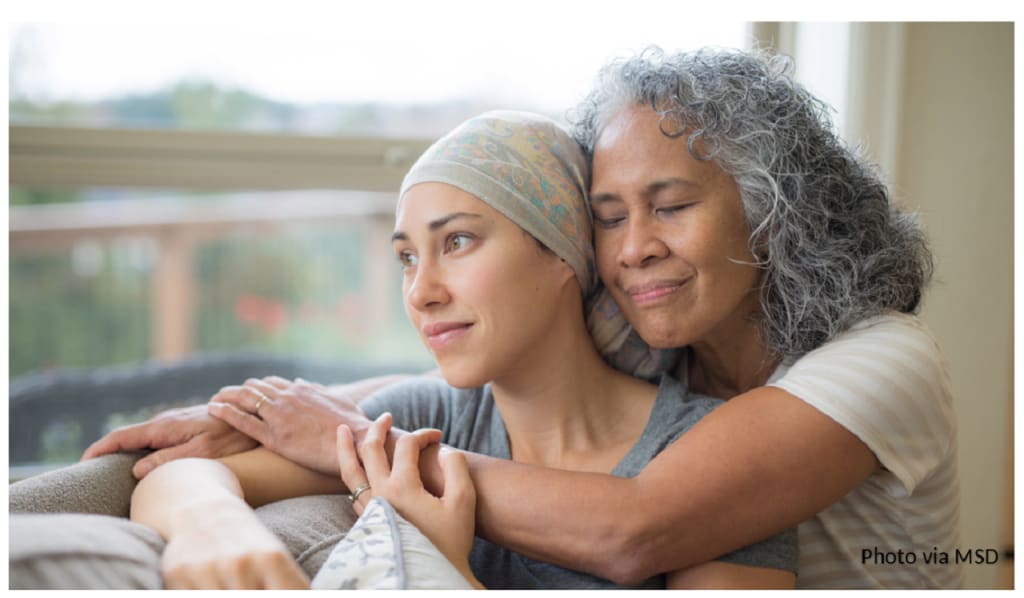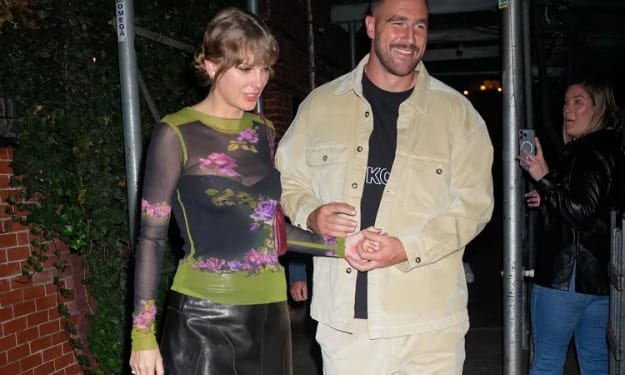Battling Cancer
5 essential guidelines for caregivers

I wrote this in June, 2015. On April 30, 2021, on the eve of Melanoma Awareness Month, my personal nemesis, it’s worth a revisit. From the archives.
Battling Cancer: 5 Essential Guidelines for Caregivers.
Nobody should fight cancer alone. Everyone deserves a loving caregiver. In the midst of the battle, you need an advocate, and a rock. Why are people reticent? Simple, it’s a terrifying commitment which comes with no rules. My late brother was lucky. He had his Amy. The world has always been filled with badass women. I will go to my grave with the knowledge that my sister-in-law Amy belongs on any maternal Mt. Rushmore of badass-ness.
I sat at Michael’s bedside while Amy watched the nurses clean Michael’s tracheostomy. I watched her turn ghostly white when she was told that when Michael went home, she’d be the one to clean the gunk out of her husband’s airway. I watched as she gulped, set her jaw, grabbed a swab, and cleaned chunks of mucus out of her husband’s airway.
I stood in the hall and listened as the care team removed a globbed-over tracheostomy insert and stitched a new one into place in Michael’s throat. I listened as she held Michael’s hand, helping him to fight down the panic and stay calm while the team worked briskly through this procedure. I watched as she, quite literally, stood and cheered when Michael re-learned how to sit up, how to transfer from bed to chair, and as Michael took his first steps in his return to the living.
After a month in the hospital, Michael returned home. I watched as Amy managed the house and kept the kids going to school and sports and the activities that make for a normal life. We were amazed as she continued her full workload in IT from the home PC and phone. She kept Michael’s feeding tube and airway neat and clean. She kept herself neat and clean. Amy stood proudly by Michael’s side while he worked at his new job; healing and good health. That’s four full-time jobs, if you’re counting. Cancer caregivers, your love and strength is astonishing and breathtaking.
Herewith, my 5 rules for cancer caregivers…
One. There will be gross and scary stuff. Accept it.
As a caregiver, you have made the choice to put the well-being of [an injured person] first. Caregiving is not just hand-holding. It is hard, gut-wrenching work. Cancer, and its treatment, wreaks havoc upon the human body. Plenty of ‘stuff’ that normally belongs on the inside of the human body will be on the outside. Mucus. Blood. Clumps of unidentifiable tissue. Tubes and drains. Pumps. Feces and urine. Steel yourself. Your cancer warrior needs every bit of your attention. You’ll have time to sort out your feelings later. Right now, you must focus on the task at hand. Complete the mission.
You’ll be scared. A lot. You will be in doctors’ offices and clinics and hospitals. You’ll see a lot of very sick people. The sights can be terrifying. The language is nearly foreign. You need to learn to ask a lot of questions. Guaranteed, the person in your charge is scared and confused as well. If you don’t understand something, ask. If you don’t understand the answer, ask again. And again, if need be. You and your loved one need and deserve to know exactly what the care team has in mind. Knowledge is the antidote to fear.
You are the link between the care team and your loved one’s non-verbal cues. Speaking for another is scary. We are socialized to not put words in another’s mouth, yet here I am telling you that you it might be necessary. Chemo, radiation, and cancer combine to create a maelstrom. There is no way to schedule appointments which coincide with the cancer warrior’s good days and strong moments. You are the key link between what your loved one feels and thinks, but may not be able to say at the time, to the care team. You know your loved one’s cancer fight better than anyone. Just like the biblical Moses had Aaron to speak for him, you will be called upon to speak for your charge.
Two. You will receive unsolicited and unwanted advice.
Deflect it. Humans do dumb stuff. This will happen. You’ll hear about a diet, or a treatment, or ‘better’ surgery, or “the best” clinic, or about “this friend of mine.” [Typically, the advice comes in one of three ways.]
a. The well-intended. These people want to offer help and solace. They don’t know how to ‘be’ with a cancer warrior. Silence makes them nervous. Ergo, they throw out some conversational crap they read on the Internet or heard on an infomercial. They’re scared, too. Treat them gently, and firmly:
“Thank-you for sharing that. We have our medical care team to handle these issues.”
b. The ‘I’ll see your lesion and raise you a metastasis’ poker player. “My cousin had cancer and she did XYZ. Are you doing XYZ? She made it, you know. She’s a three year cancer survivor.” With these people, you need to be more firm:
“We’re glad your cousin is doing well. We have our medical care team to handle these issues.”
c. The pushy and self-righteous. These people are offensive, and the type of offense varies widely. Suffice to say, if you’re offended, they’re in this camp. You need a nice way to say STFU:
“We have our medical care team to handle that. We have no interest in hearing about this from you again. Thank-you.”
Three. Take care of yourself.
Short of having cancer yourself, life as a caregiver is the Sturm und Drang of human existence. If you cannot or will not care for yourself, soon you will not be able to care for your charge. Get some fresh air and exercise. Nothing, absolutely nothing is as good for you as getting out. Ride your bike or go for a run, get in the kayak, do a little fishing, shoot some hoops at the park, go for a walk in the park or woods- whatever moves you, get moving! You need to empty the tank of cancer angst and refill yourself with some nature. Nothing will take care of your emotional and physical needs nearly so much. If you can’t get out, then hit the treadmill, or the Zumba class, or the weight room. Get going. I mean it.
Four. Allow yourself the courtesy of emotions.
This caregiver stuff is just damn hard. It’s okay to cry. Being sad is fine. Let yourself be happy. Look into a support group via the cancer center. Find an online support group. My brother put together his own support group on Facebook. Get out with friends for a night. Play some cards, yak it up. Go to the movies, head to the sports bar with your buddies for a beer and the game. One friend of mine swore by Drag-Queen Bingo.
As a caregiver, you deserve a break. Which leads us to…
Five. Ask for help.
What you do as a caregiver is simply exhausting. You cannot do this forever. You cannot do this alone. You are surrounded by people who want to help, but have no idea, none, of what you need done. The old military adage is, “When placed in charge, take command.” You are in charge. It’s okay to say, “I need you to go to the grocery store.” It’s fine to say, “Would you please stay with Bill for an hour this afternoon while he naps so I can go for a swim?” When my brother was ill, my wife and the other two sisters-in-law took charge of regular house cleaning. These three women would storm the house, and it would be spick and span by the time Michael and Amy were home from their appointment.
Listen to your heart. Listen with all your heart. No one set of caregiver guidelines is correct. You know your own circumstances better than anyone. When in doubt, listen to yourself. Give yourself permission to trust in your judgment. You are smart. You are capable. You are worthy of this great thing.
Most importantly, when you are with your loved one, listen with all your heart. Your cancer warrior needs you. S/he needs you weak. Needs you strong. Needs your wisdom. Needs your touch. Regardless of how this cancer journey turns out, you will be transformed.
When my brother Michael’s tumor recurred, for the third and final time, I drove him to the Henry Ford Hospital Clinic in Detroit for a biopsy. Dr. Ghanem, a stand-up guy to the end, made it clear that until the lab reports were read, nothing was certain, but that he was not hopeful. Michael and I held hands for the car ride home.
I was standing there, in their kitchen, as Michael and Amy leaned forward, foreheads touching, holding hands, as I told Amy exactly what Dr. Ghanem had said. I watched my brother’s eyes widen as Amy took in the news. I watched Amy gasp, and catch herself. I saw tears begin to roll down Michael’s cheeks as he mouthed “I’m sorry, Amy. I love you.” I saw Amy begin to cry as they stared into each other’s eyes. I had to walk down the hall into their sons’ bedroom, where I sat on the edge of a bed, crying myself.
Michael passed away two weeks later.
A few days after Michael’s death, I walked in on my wife Cath and Amy, crying in each other’s arms. I heard Amy say “I just wish I could have done more for him.” No one, Ms. Amy, could possibly have done more for another human being than you did for your husband, the boys’ father, our brother, our son, our uncle, our friend Michael Alan Stanley. Thank-you.
For the rest of you who will do this great thing for someone you love, this greatest act of love, thank-you as well.
My colleague John Willey and I created a video with this piece. You can view it here.
About the Creator
David Louis Stanley
Educator.Poet.Author.Writer.Voice-for-Hire.
Husband.Father.Friend.
Thinker of thoughts who gets stuff done.
Melanoma Awareness Advocate.
Three books in print.
Never miss a chance to do good.
I write sonnets.
I’m bringing sonnets back.™






Comments
There are no comments for this story
Be the first to respond and start the conversation.